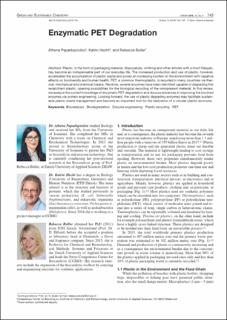Please use this identifier to cite or link to this item:
https://doi.org/10.21256/zhaw-19228Full metadata record
| DC Field | Value | Language |
|---|---|---|
| dc.contributor.author | Papadopoulou, Athena | - |
| dc.contributor.author | Hecht, Katrin | - |
| dc.contributor.author | Buller, Rebecca | - |
| dc.date.accessioned | 2020-01-29T09:41:41Z | - |
| dc.date.available | 2020-01-29T09:41:41Z | - |
| dc.date.issued | 2019-09 | - |
| dc.identifier.issn | 0009-4293 | de_CH |
| dc.identifier.uri | https://digitalcollection.zhaw.ch/handle/11475/19228 | - |
| dc.description.abstract | Plastic, in the form of packaging material, disposables, clothing and other articles with a short lifespan, has become an indispensable part of our everyday life. The increased production and use of plastic, however, accelerates the accumulation of plastic waste and poses an increasing burden on the environment with negative effects on biodiversity and human health. PET, a common thermoplastic, is recycled in many countries via thermal, mechanical and chemical means. Recently, several enzymes have been identified capable of degrading this recalcitrant plastic, opening possibilities for the biological recycling of the omnipresent material. In this review, we analyze the current knowledge of enzymatic PET degradation and discuss advances in improving the involved enzymes via protein engineering. Looking forward, the use of plastic degrading enzymes may facilitate sustainable plastic waste management and become an important tool for the realization of a circular plastic economy. | de_CH |
| dc.language.iso | en | de_CH |
| dc.publisher | Schweizerische Chemische Gesellschaft | de_CH |
| dc.relation.ispartof | Chimia | de_CH |
| dc.rights | http://creativecommons.org/licenses/by-nc/4.0/ | de_CH |
| dc.subject.ddc | 363: Umwelt- und Sicherheitsprobleme | de_CH |
| dc.subject.ddc | 660: Technische Chemie | de_CH |
| dc.title | Enzymatic PET degradation | de_CH |
| dc.type | Beitrag in wissenschaftlicher Zeitschrift | de_CH |
| dcterms.type | Text | de_CH |
| zhaw.departement | Life Sciences und Facility Management | de_CH |
| zhaw.organisationalunit | Institut für Chemie und Biotechnologie (ICBT) | de_CH |
| dc.identifier.doi | 10.2533/chimia.2019.743 | de_CH |
| dc.identifier.doi | 10.21256/zhaw-19228 | - |
| zhaw.funding.eu | No | de_CH |
| zhaw.issue | 9 | de_CH |
| zhaw.originated.zhaw | Yes | de_CH |
| zhaw.pages.end | 749 | de_CH |
| zhaw.pages.start | 743 | de_CH |
| zhaw.publication.status | publishedVersion | de_CH |
| zhaw.volume | 73 | de_CH |
| zhaw.publication.review | Peer review (Publikation) | de_CH |
| zhaw.webfeed | Biokatalyse | de_CH |
| zhaw.author.additional | No | de_CH |
| Appears in collections: | Publikationen Life Sciences und Facility Management | |
Files in This Item:
| File | Description | Size | Format | |
|---|---|---|---|---|
| 2019_Papadopoulou-etal_Enzymatic-PET-degradation.pdf | 516.81 kB | Adobe PDF |  View/Open |
Show simple item record
Papadopoulou, A., Hecht, K., & Buller, R. (2019). Enzymatic PET degradation. Chimia, 73(9), 743–749. https://doi.org/10.2533/chimia.2019.743
Papadopoulou, A., Hecht, K. and Buller, R. (2019) ‘Enzymatic PET degradation’, Chimia, 73(9), pp. 743–749. Available at: https://doi.org/10.2533/chimia.2019.743.
A. Papadopoulou, K. Hecht, and R. Buller, “Enzymatic PET degradation,” Chimia, vol. 73, no. 9, pp. 743–749, Sep. 2019, doi: 10.2533/chimia.2019.743.
PAPADOPOULOU, Athena, Katrin HECHT und Rebecca BULLER, 2019. Enzymatic PET degradation. Chimia. September 2019. Bd. 73, Nr. 9, S. 743–749. DOI 10.2533/chimia.2019.743
Papadopoulou, Athena, Katrin Hecht, and Rebecca Buller. 2019. “Enzymatic PET Degradation.” Chimia 73 (9): 743–49. https://doi.org/10.2533/chimia.2019.743.
Papadopoulou, Athena, et al. “Enzymatic PET Degradation.” Chimia, vol. 73, no. 9, Sept. 2019, pp. 743–49, https://doi.org/10.2533/chimia.2019.743.
Items in DSpace are protected by copyright, with all rights reserved, unless otherwise indicated.